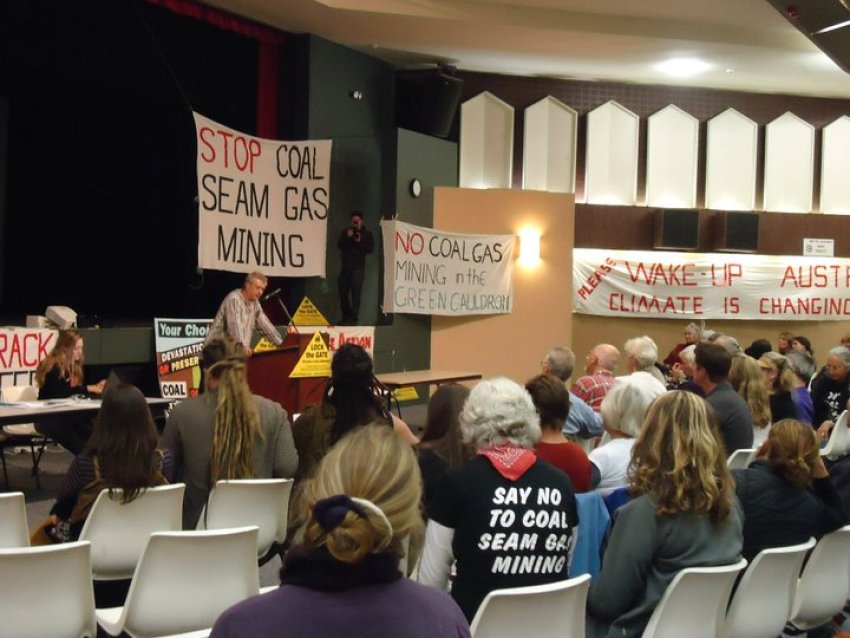
About 150 representatives engaged in the campaign against coal and coal seam gas mining attended the inaugural annual general meeting of the Lock the Gate Alliance, held in Murwillumbah, NSW, over June 11 and 12.
Lock the Gate (LTG) is a national body that represents more than 90 community groups and hundreds of individuals concerned about the impacts of coal and coal seam gas mining.
The meeting elected four office bearers and five committee members, including Sarah Moles as secretary and Sean Gough as treasurer.
Friends of the Earth spokesperson Drew Hutton was elected national president.
Hutton told the meeting the expansion of coal and coal seam gas mining has “massive implications” for economic development, social structures, environment and culture.
“We’re here because there is a major challenge to the Australian landscape and people,” he said.
Hutton said individuals were being forced to make decisions, such as those around land access rights, which affected entire communities.
To this end, Hutton reinforced Lock the Gate’s strategic campaigning principle of non-violent direct action taking the form of non-cooperation.
“At the core of our campaign is non-cooperation. We must withdraw from any negotiations with mining companies.”
Hutton also spoke on the need for LTG to work towards mass mobilisation.
“We’ve got an issue that will directly affect the majority of people in this country,” he said.
“We need to have mass mobilisation bigger than this country has ever seen. We can’t do anything less.”
This call comes after thousands turned out for rallies and actions in Sydney, Murwillumbah, Byron Bay and the Illawarra earlier this year.
In addition to LTG's broad supporter base of farmers, landowners and environmentalists, Hutton said that there are other networks to engage in the campaign.
“We must bring together key civil society organisations: councils, churches [and] unions,” he said.
Hutton emphasised the importance of taking the campaign against fossil fuel mining into the towns and cities.
Sydney is currently under licence for coal seam gas exploration and St Peters resident Jacinta Green has taken part in the local campaign against it as a member of Sydney Residents Against Coal Seam Gas (SRACSG).
SRACSG was formed in response to Dart Energy’s proposal for exploratory coal seam gas drilling at a site in Sydney’s inner-west.
Green was elected vice-president of LTG at the AGM.
Green called for more stringent environmental measures to be included in the coal seam gas licence granting process, and told the meeting she was focused on “getting results” for the campaign.
During the two-day meeting, working groups were created to develop strategy for events, resources and communications.
A commitment was made for focused campaigning in the lead up to the Queensland state election, as well as to continue the campaign strategy of blockading development and taking legal action where applicable.
The meeting resolved to hold a national day of action against coal and coal seam gas mining this year.
LTG’s demands were restated, which include calling for an immediate moratorium on approvals of coal and coal seam gas mining projects and a full independent national inquiry into the industries.
In its Overarching Statement, LTG says: “We believe that neither we, nor our governments (at all levels), are sufficiently well informed about these industries, about their true role in our economy and their impact on our health and welfare as a nation and within the diverse communities that constitute our nation.”
Dayne Pratzky from the Tara residential estate told the AGM that his community is bolstering its campaign against Queensland Gas Company (QGC). Landowners were recently issued with letters stating the company’s intent to expand gas mining in Tara.
For more than two months the community at Tara has carried out a people’s blockade to halt QGC attempts to connect a pipeline between existing gas wells and a nearby gas processing plant.
Speaking at a Sydney forum hosted by the Australian Centre for Climate and Environment Law on June 18, Queensland University of Technology academic Dr Nicola Durrant said: “The Queensland government considers risks [of coal seam gas industry] have been exaggerated by local land owners.”
Durrant said that legislation around approval and regulation of coal seam gas projects in Queensland was “convoluted”. She said she was not convinced the legislation would adequately protect the environment.
NSW Farmers Association vice president Fiona Simson spoke about the legal rights of landowners and potential impacts of mining on groundwater, reflecting the concerns of many communities, including Tara.
“It is my understanding we own the soil on our land, but not the valuable stuff underneath it.
“So we need to do what the government says in allowing access to the mining companies to exploit the minerals, supposedly on behalf of the state.”
Executive Director of the Mineral Resources branch of NSW Department of Trade and Investment, Brad Mullard, played down potential risk factors of the coal seam gas industry, saying that the community should have confidence gas companies are putting in place systems to ensure integrity of coal seam gas mining process.
Mullard is also a member of the National Low Emission Coal Council, the National Carbon Storage Taskforce and the NSW Clean Coal Council.
Mullard said he believed Australians were more concerned about energy security than climate change, however was dismissive of renewables as a way of providing energy security.
“If the sun doesn't shine and the wind doesn't blow, you need the ability to pick up power ... so at the moment people look to gas,” he said.
Comments
Anonymous replied on Permalink